Are you tired of chasing after things that don’t make you happy? True happiness doesn’t come from buying lots of stuff. It comes from making real connections, creating memories, and living simply. Dave Ramsey, a well-known financial expert, said, “We buy things we don’t need, with money we don’t have, to impress people we don’t like.” By choosing a minimalist lifestyle, you can make your life simpler, less stressful, and focus on what’s important.
Key Takeaways:
- Choosing a minimalist lifestyle can make you happier, help you focus better, and make you more financially secure.
- Going minimalist can make you feel less lonely and improve your overall well-being.
- Minimalism encourages living sustainably and making smarter buying choices, which is better for the planet.
- Starting with simple daily habits can make it easier to adopt a minimalist lifestyle.
- Clearing out your home and closet can free up space, both physically and mentally, letting you focus on what’s really important.
What is Minimalism?
Minimalism is a way of life that values simplicity. It teaches that having fewer things lets you live more intentionally. You focus on what’s important and meaningful to you. Minimalist author Joshua Becker says it’s about promoting what we value and removing distractions.
It’s not about having nothing. It’s about making space for more time, freedom, joy, and energy for what matters most. Minimalism is not just about owning less than 100 things. It’s about having items that add value and removing the clutter from life.
Successful minimalists lead different lives, like having a family or living in exotic places. They own few possessions but still live fulfilling lives. The key is to focus on what adds value and remove the rest.
Minimalism can free you from fear, worry, and depression. It helps you eliminate discontent and reclaim your time. You can live in the moment, pursue your passions, and find your mission.
It leads to real freedom, more creativity, and a focus on health. You grow as an individual, contribute beyond yourself, and find your purpose. Minimalism is about living simply to find happiness and fulfillment.
It requires big changes in how you think, act, and live. But, it gets more rewarding as you move forward. There are many resources available for those interested in learning more about minimalism.
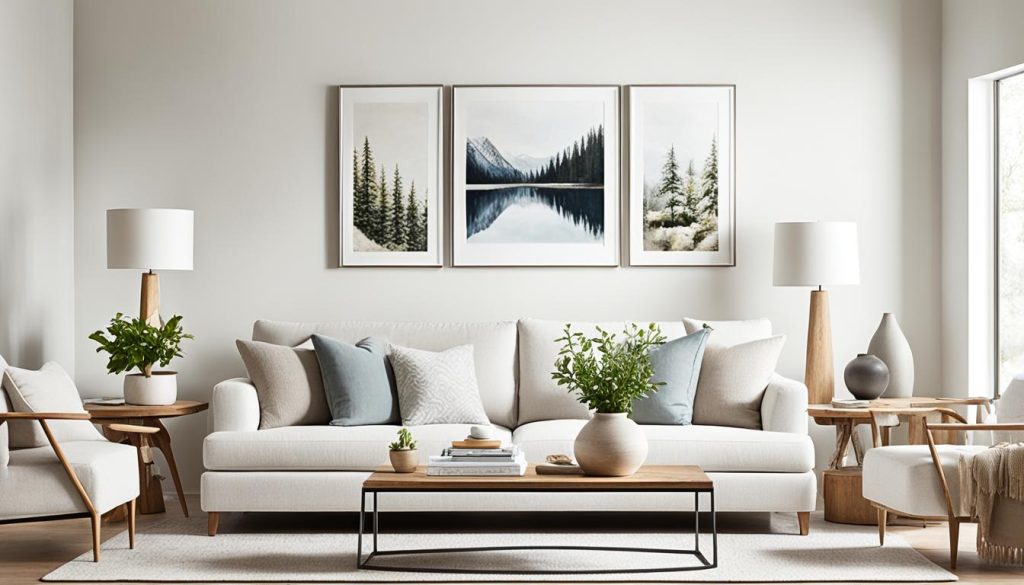
The 30-Day Minimalism Game is a challenge to minimize your possessions for a month. There are also tips for writing about minimalist ideas in different formats.
Minimalism started in the arts, with simple lines and few colors. Now, it’s a tool for anyone to live more intentionally, no matter their living space or lifestyle. It’s a continuous practice that helps you make big changes and focus on what’s important.
The Benefits of Minimalist Lifestyle Choices
Living a minimalist life has many benefits. It can make you less stressed and help you focus better. You can save money and live more sustainably. Minimalism changes your life in big ways.
Reduced Stress and Increased Focus
Having fewer things can make you less stressed and anxious. Managing lots of stuff can be overwhelming. Minimalists find it easier to keep their spaces tidy, which helps them stay calm and focused.
This calm helps them spend more time on what’s important. They can focus on activities and people they care about.
Financial Savings and Sustainability
Minimalists save money by choosing quality over quantity. They spend less on things they don’t need. This lets them save more or enjoy experiences that matter to them.
Living minimally also means less waste and a smaller environmental impact. It’s a way to live more sustainably.
Improved Self-worth and Contentment
Minimalism helps you stop comparing yourself to others and chasing after things you don’t need. It makes you focus on what’s truly important. This leads to feeling better about yourself and being more content.
You start to appreciate the simple things in life more. Minimalism changes your life for the better. It reduces stress, saves money, and boosts your self-worth. It helps you live a more meaningful life.
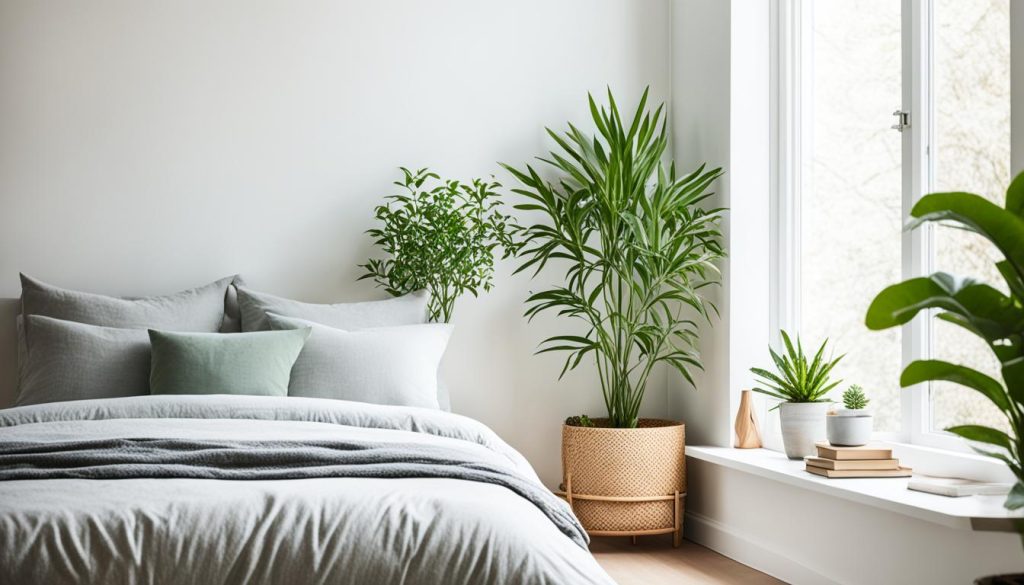
“Minimalism is the intentional promotion of the things we most value and the removal of everything that distracts us from it.” – Joshua Becker, author and minimalist
Start by Decluttering Your Home
If you feel overwhelmed by the stuff in your home, it’s time to start decluttering. Most people have too much stuff – clothes they don’t wear, books they haven’t read, and lots of trinkets with no value. Getting rid of things you don’t need can help you live more intentionally.
Decluttering your belongings and keeping only what brings joy can make your space more peaceful. It helps you focus better, be more productive, and feel calmer every day.
Fundamental Simplicity Principles
- Collect: Empty the space to organize better.
- Choose: Pick only what’s really important.
- Eliminate: Get rid of things you don’t need, donate or throw them away.
- Organize: Arrange what you keep neatly, leaving space to look simple.
10 Ways to Start Decluttering
- Start clearing a starting zone: Make a clutter-free area and grow it throughout your home.
- Clear off a counter: Keep surfaces clean, except for what you really need.
- Pick a shelf: Declutter and organize one shelf at a time.
- Schedule a decluttering weekend: Set aside time to declutter with your family.
- Pick up 5 things, and find places for them: Assign a spot for things you use often.
- Spend a few minutes visualizing the room: Imagine a tidy space and see what’s really important.
- Put a load in your car for charity: Box up items to donate and drop them off quickly.
- Pull out some clothes you don’t wear: Sort clothes to keep only what you use often.
- Clear out your medicine cabinet: Throw away expired or unused items, keep only what you need.
- Pull everything out of a drawer: Empty drawers to sort items into keep, move, or throw piles.
By using these steps and decluttering your home, you can make a minimalist space. This space supports clarity, calm, and a more intentional way of living.
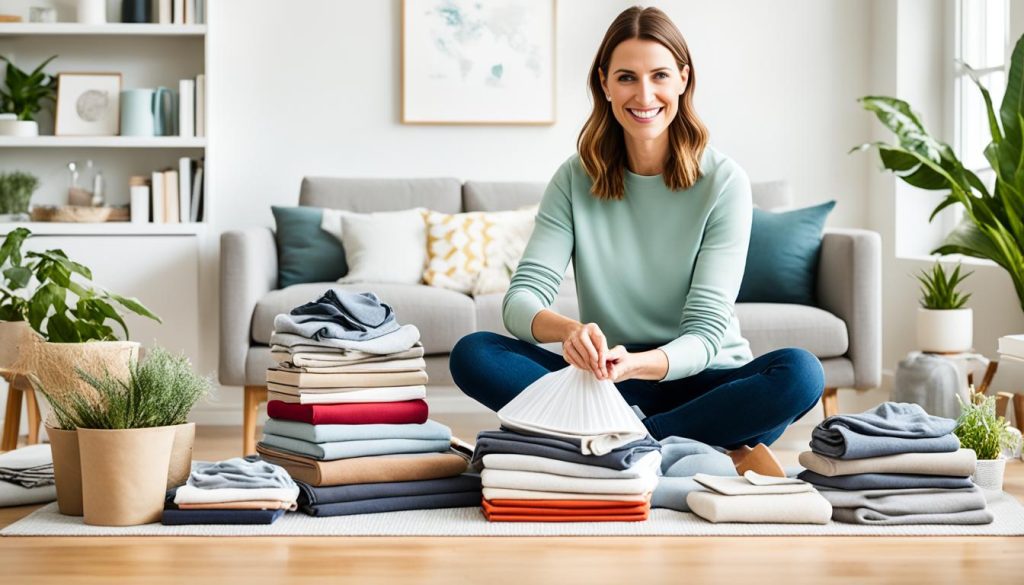
Shop Less and Choose Quality Over Quantity
Living a minimalist life means making smart shopping choices. By being mindful when you buy things, you can cut down on clutter and waste. You’ll also learn to value quality more than how much you have.
Try the “one-in, one-out” rule to help you shop better. When you buy something new, get rid of an old item. You can donate, sell, or recycle it. This habit makes you think harder about what you buy and keeps your stuff meaningful.
Embrace the 30-30 Rule
The “30-30 rule” is another good idea. Wait 30 hours before buying anything under $30. This gives you time to think if you really need it or if it’s just an impulse buy. By thinking before you buy, you spend less and stick to what’s important to you.
Shopping lists can also help you stay focused and avoid buying things you don’t need. Don’t just look around without a plan. Having a clear idea of what you want saves time and money. It also helps you stick to choosing quality over quantity.
“The minimalist lifestyle helps reduce waste generation to nearly five pounds per day. In 2018, humans generated approximately 294.4 million tons of municipal garbage. The minimalist lifestyle advocates for the use of fewer new items to decrease environmental impact.”
By shopping mindfully, you’ll buy things that really matter to you. Remember, it’s all about quality over quantity. This way, you help the environment too.

Minimalism isn’t about giving up things you love. It’s about finding happiness in what’s truly important. By shopping more thoughtfully, you’ll tidy up your space and feel more in control and content with what you own.
Simplify Your Schedule
Living a minimalist life means not just decluttering our stuff but also our schedules. Our schedules can get too full and stressful. To take back control, we need to learn to say no and focus on what’s important.
Saying No with Confidence
Saying no is key in managing your time well. It might be hard at first, but it’s crucial to politely decline things that don’t fit your values or drain your energy. Remember, your time and energy are precious. Choose how you use them wisely.
- Pause before you answer any new request.
- Check if the request matches your priorities and schedule.
- Say no politely, like “I won’t be able to make it, but thanks for inviting me.”
- If you can’t fully commit, suggest an alternative time.
Saying no doesn’t mean you’re a bad friend or coworker. It shows you’re serious about living a balanced life.
Prioritizing Your Commitments
After getting good at saying no, focus on what’s left. Look at your schedule and pick tasks that match your values and make you happy. These should be your top priorities. Everything else can be let go or given to someone else.
- Make a list of all your commitments.
- Sort them by how important and impactful they are to you.
- Drop or delegate tasks that aren’t crucial to free up time.
- Make time for self-care, hobbies, and important relationships.
By focusing on what’s important, your schedule will be easier to handle. You’ll have the energy and mental space for what really matters to you.
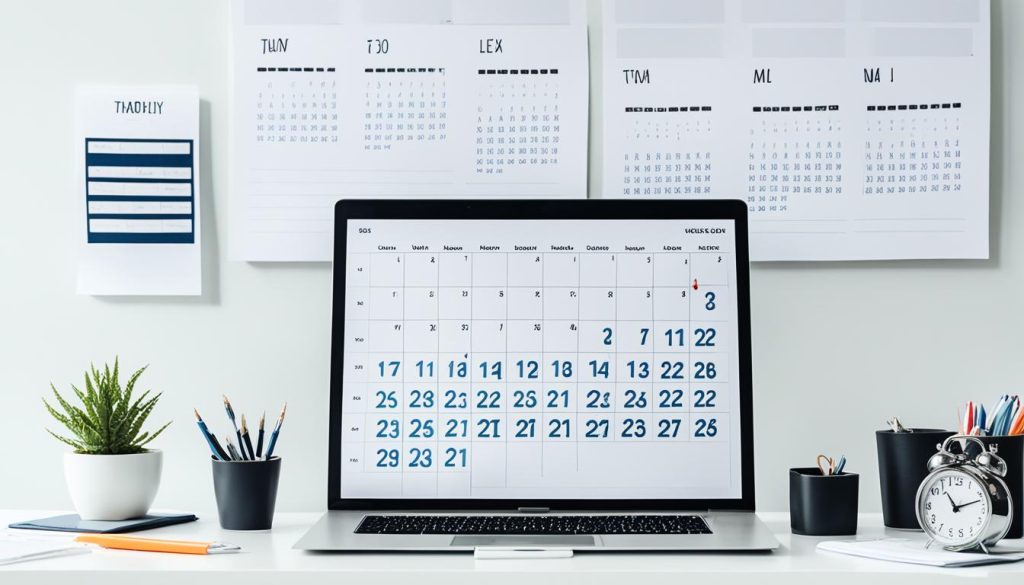
“The ability to simplify means to eliminate the unnecessary so that the necessary may speak.” – Hans Hofmann
Adopting a minimalist mindset in your schedule can greatly reduce stress and boost productivity. By saying no and prioritizing, you’re on your way to a simpler, more intentional life.
Limit Your Wardrobe to Timeless and Versatile Pieces
Living a minimalist life can also mean what you wear. Instead of buying lots of trendy items, focus on a minimalist wardrobe with timeless and versatile clothing. This makes getting dressed easier and helps the environment by cutting down on fast fashion and impulse buys.
A study found that 85% of people struggle to pick what to wear because their closets are too full and trends change fast. With a capsule wardrobe of quality items, you can solve this problem and make your wardrobe simpler.
Brands that focus on sustainable fashion say that capsule wardrobes help reduce harm to people and the planet. Knowing what you like in fashion is key to making a minimalist wardrobe that fits your style and needs. Choosing neutral colors makes it easier to mix and match your clothes.
| Minimalist Wardrobe Essentials | Quantity |
|---|---|
| Classic white t-shirts | 3-5 |
| Tailored black pants | 2-3 |
| Little black dresses | 1-2 |
| Quality denim jeans | 2-3 |
Choosing quality over quantity is key for a minimalist wardrobe. Buying clothes that fit well and last a long time boosts your confidence and makes you look better. A capsule wardrobe also means less time spent deciding what to wear.
Switching to a minimalist wardrobe and capsule wardrobe approach saves time, lowers stress, and helps you make better fashion choices. It matches your style and values. This way, you help the environment and feel better too.
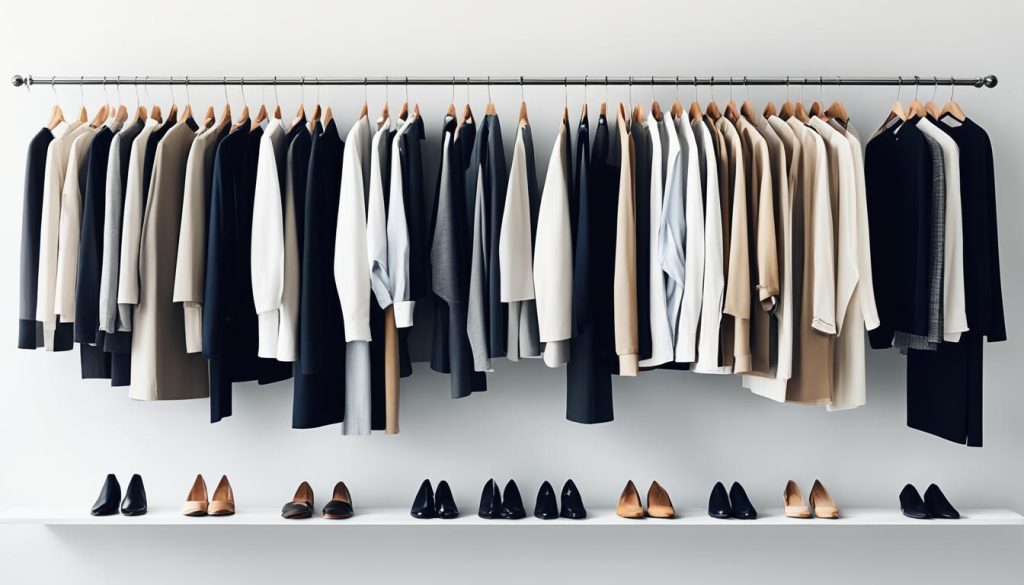
Declutter Your Online Spaces
Minimalism isn’t just about getting rid of stuff you own. It also means cleaning up your digital life. Digital minimalism is about using fewer digital tools on purpose. This can make you less distracted, help you focus better, and stick to what you believe in.
Unfollow and Limit Social Media
Begin by unfollowing people on social media who don’t help you feel good. Make sure your online friends and feeds are worth your time. Also, try to spend less time on social media by setting limits. This helps you avoid getting lost in endless scrolling and supports a social media detox.
Studies show that people into minimalism spend less and own fewer things. This shows they focus on what’s important. Cleaning up your digital life can do the same thing for you. It frees up your mind and heart for what really counts.
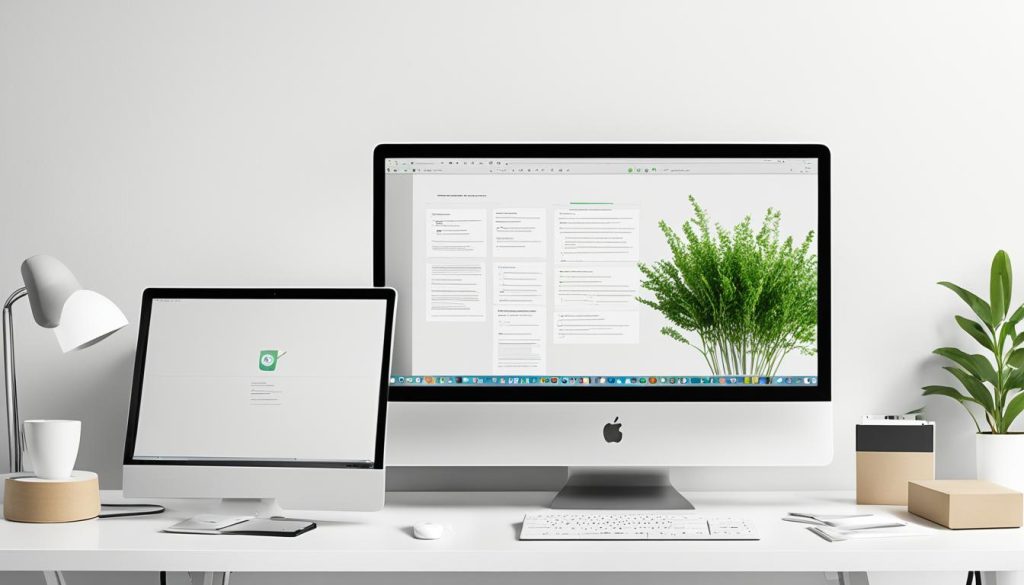
“The ability to focus is a superpower.” – Cal Newport, author of Digital Minimalism
Digital minimalists aim to get rid of digital clutter to use only what’s important. They follow the 80/20 rule, focusing on a few key online activities for better results. This can greatly improve your life.
Being surrounded by clutter, both physical and digital, can be stressful. It shows how important it is to reduce digital noise for peace of mind. Our attention is precious and often targeted for profit. So, we must be careful in how we use online spaces.
By decluttering your online spaces, you take back control of your digital world. This leads to a more thoughtful relationship with technology. You’ll likely see better productivity, focus, and overall well-being.
Minimalist Lifestyle Choices
Living a minimalist lifestyle is not for everyone, but it can simplify your life and reduce stress. By decluttering your home and shopping mindfully, you can focus on what truly matters. This approach also helps you enjoy more and feel fulfilled.
Many people feel overwhelmed by clutter. Adopting a minimalist lifestyle can ease that stress. In fact, 64% of people want to live simpler for its benefits.
Starting a minimalistic life can be both easy and hard. Decluttering your stuff is a key step. 78% of people find it rewarding and freeing.
Living with less can save money by avoiding unnecessary buys. 53% of minimalists like their clothes more. And 72% feel happier and more fulfilled.
Minimalism makes you happier with what you have and less stressed. 87% of minimalists feel less stressed and more focused.
Minimalism is also good for the planet by promoting sustainable shopping. 47% of shoppers now choose eco-friendly items.
Minimalism isn’t just about cleaning your space. It also means caring for yourself, your money, and your career. 61% of minimalists value experiences over stuff, which makes them happier.
Minimalism means decluttering and simplifying your life in many ways. 68% of those living simply feel more organized and in charge.
Minimalism looks different for everyone, but it’s all about living intentionally. By choosing a minimalist life, you can live better and be happier. It’s about living by your values and enjoying life more.
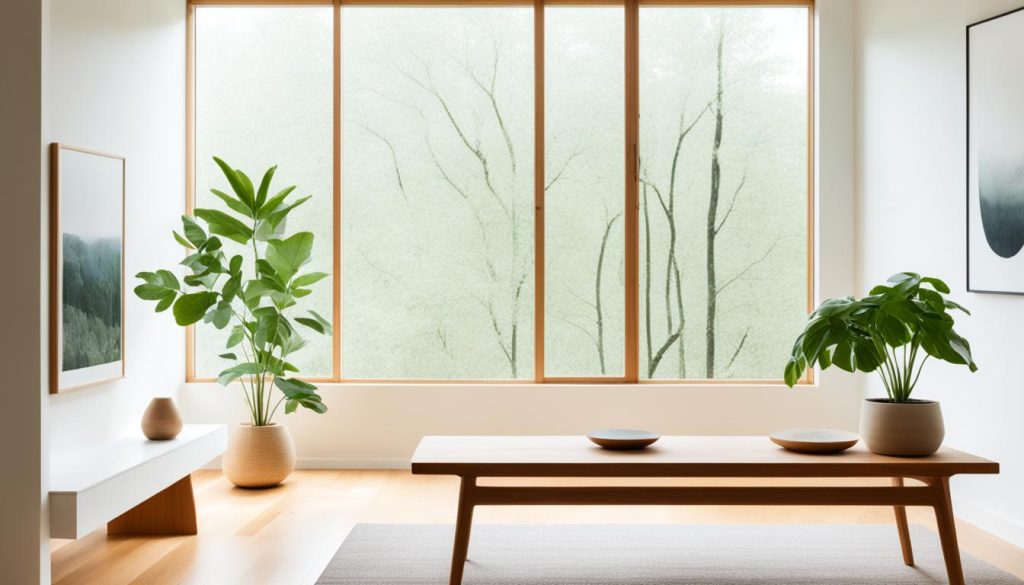
| Statistic | Percentage |
|---|---|
| Individuals interested in transitioning to a minimalist lifestyle | 64% |
| Individuals practicing minimalism who reported feeling less stressed and more focused | 87% |
| People who find decluttering their space satisfying and liberating | 78% |
| Individuals following a minimalist wardrobe who reported feeling more satisfied | 53% |
| Individuals practicing minimalism who reported an increase in overall life satisfaction | 72% |
| Consumers opting for sustainable products in line with a minimalist lifestyle | 47% |
| Individuals embracing simplicity who reported feeling more organized and in control | 68% |
“Minimalism is not about what you take away, it’s about what you leave behind.”
Conserve Energy and Reduce Waste
Living minimally is key to sustainable living. By using less energy and making the most of what you have, you help the planet. Simple actions like turning off lights, using power strips, and reusing items can make a big difference.
Reduce Your Energy Consumption
First, find and stop “energy vampires” at home, like devices that use power when off. Unplug them or use power strips to save energy. Also, choose energy-saving LED bulbs, which use much less energy than old bulbs.
Good insulation helps save energy too. Sealing your home’s cracks with foam can cut heating and cooling costs by up to 25%. Keeping your HVAC system in good shape also helps save energy.
Reduce Waste and Embrace Circular Living
- Focus on the “3 R’s”: Reduce, Reuse, and Recycle. Cut down on what you use, fix things, and recycle when you can.
- Eat more plants, as it’s better for the planet than eating a lot of meat.
- Use less gas by walking, biking, or taking public transport to lower your carbon footprint.
- Choose quality, versatile clothes to wear more often and reduce fast fashion’s harm to the environment.
- Less screen time and organizing your digital life can make you more productive and happy.
By saving energy and reducing waste, you make your minimalist choices support a sustainable future. Every step you take helps make the world greener and more resilient.
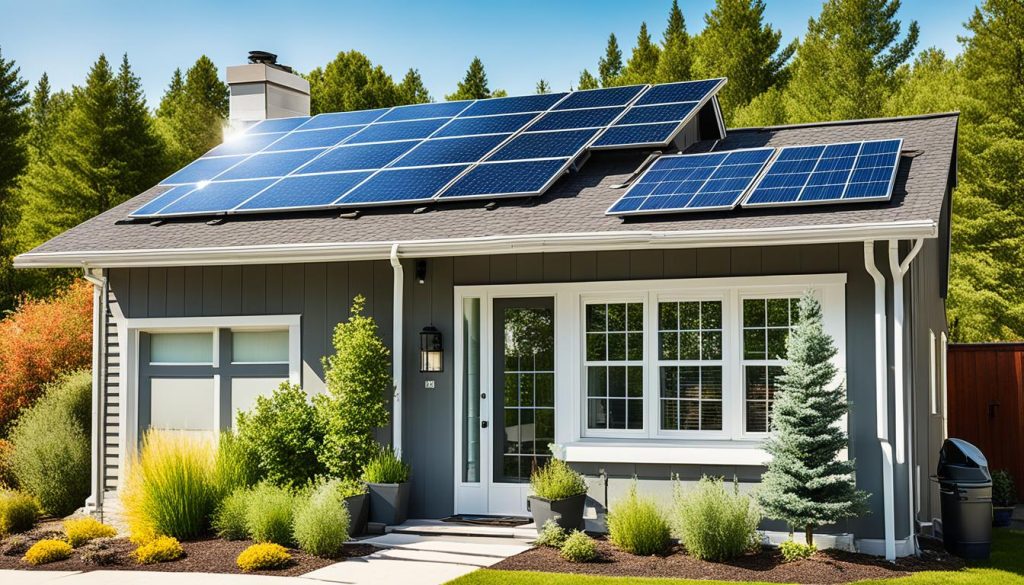
| Sustainable Practice | Environmental Impact |
|---|---|
| Reducing food waste | About 30% of food at the consumer and retail level is wasted in the U.S., contributing to greenhouse gas emissions and resource depletion. |
| Choosing eco-friendly transportation | Nearly 30% of greenhouse gas emissions in the U.S. in 2019 came from transportation, with light-duty vehicles responsible for 58% of those emissions. |
| Investing in energy-efficient appliances | LED bulbs are up to 80% more energy-efficient than traditional incandescent lights, significantly reducing energy consumption. |
“Making small sustainable changes collectively can have a significant impact on the environment.”
By saving energy and reducing waste, you help the planet while simplifying your life. Your choices reflect your values and support a sustainable future.
Rethink Gift Giving
Living a minimalist life means changing how you think about giving gifts. Instead of buying things on a whim, think about giving experiences. These can be concert tickets, restaurant dinners, or spa days. They are thoughtful and don’t add clutter.
Being more careful when you shop can also help. Look for sales and deals all year, and set a budget to stop impulse buying. This keeps you true to your minimalist values and helps you stay within your budget.
Embrace Minimalist Gift-Giving
Minimalist gift-giving means less focus on things and more on experiences. Here are some ideas for gifts that are meaningful and based on experiences:
- Gift certificates for a special outing or activity, such as a cooking class or a day at the museum
- Tickets to a concert, play, or sporting event that the recipient would enjoy
- A donation to a charity or nonprofit organization in the recipient’s name
- Homemade or handcrafted gifts, such as baked goods, artwork, or personalized keepsakes
- The gift of your time, such as offering to help with a project or task the recipient has been meaning to tackle
By focusing on experiences and thoughtful gifts, you can live a minimalist life that values connection and making memories.
“The best things in life aren’t things.” – Art Buchwald
Minimalism in gift-giving means less clutter and being more mindful of what we buy. It encourages us to think differently about giving gifts. This can inspire others to be more sustainable and thoughtful in their gift-giving.

Minimalism isn’t about living with nothing. It’s about focusing on what’s important. By applying these ideas to your gifts, you can make deeper connections and support a sustainable future.
Create Intentional Spaces
Embracing a minimalist lifestyle means designing your living spaces with care. This approach helps improve your well-being and matches your values. It’s about making intentional living spaces that are both minimalist and focus on your wellness and value-aligned home.
Minimalism means owning fewer things, which lets you spend money on what’s important. Studies show it can lead to eating healthier and cutting down on sugar. It also helps in making new friends and getting involved in your community, and boosts meditation and solitude for a deeper spiritual life.
Here are some tips for creating intentional living spaces:
- Declutter your home a few times a year, using containers or bins to categorize your belongings.
- Opt for adjustable metal shelves to create a flexible and organized storage solution.
- Utilize plastic bins to keep your kitchen, pantry, refrigerator, and freezer tidy and accessible.
- Curate a cozy and welcoming atmosphere in your home, focusing on items you truly love or that serve a specific purpose.
- Avoid impulse buys by placing potential purchases next to garbage bins in stores to assess their appeal.
A recent survey found that 78% of people felt happier after using intentional design in their homes. Households that went minimalist saw a 42% drop in clutter in just six months. By making intentional living spaces that reflect your values and support your health, you can improve your life and enjoy your minimalist path more.
“Design your living spaces to nurture your well-being and align with your values.”
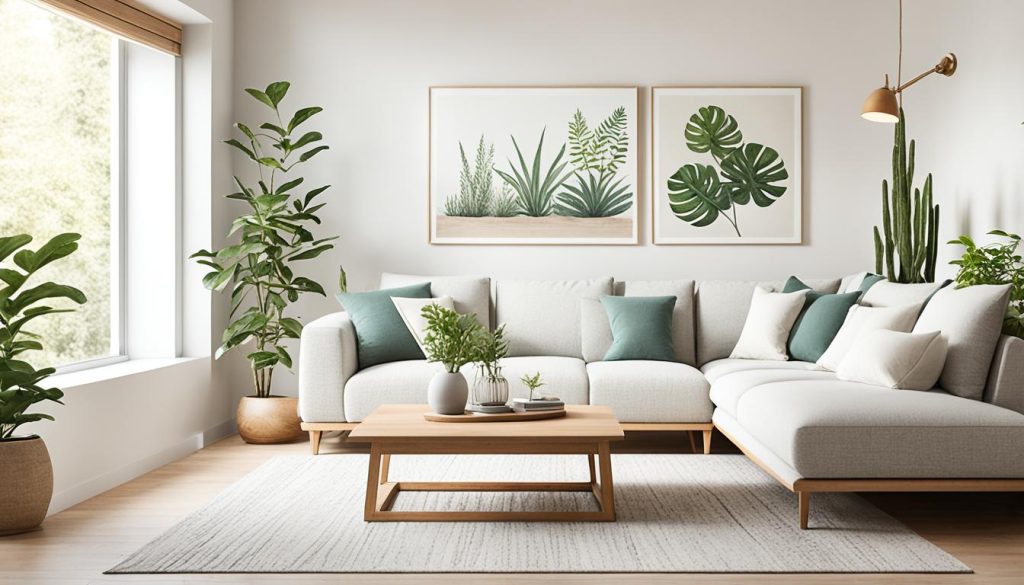
| Benefit | Percentage |
|---|---|
| Decrease in stress levels among individuals who created intentional spaces | 35% |
| Increase in sales of quality, durable home décor items as more consumers shift towards intentional design | 15% |
| Respondents willing to pay a premium for handmade, personalized items to incorporate into their intentional living spaces | 64% |
| Increase in choosing sustainable and eco-friendly materials for home furnishings among intentional design enthusiasts | 27% |
Embrace Minimalism as a Journey
Minimalism is not just a goal, but a journey of self-reflection and change. As you clear out your stuff and simplify your life, you might find new ways to live on purpose. Think of minimalism as a journey of growth and self-discovery. Be kind to yourself as you go through this big change.
People want simplicity and a clear life. Social media has made minimalism popular, showing us how to live with less. The author has been on this path for almost ten years, showing it’s a long-term process.
Starting to declutter can feel hard, especially when you’re moving. But, living with less has big rewards. Too much stuff can make us feel anxious and stressed. Living simply can help us focus better and feel clearer.
The author moved to a smaller house, teaching kids to value relationships over stuff. This taught them to be thankful and live on purpose.
Moving to a smaller space gave the author more time and energy. They loved living in a home that matched their values.
“Minimalism encourages individuals to reassess priorities, leading to reduced stress and enhanced clarity of mind.”
Embracing minimalism means reflecting on what’s important to you. It’s a way to grow and live better. There are many resources out there to help you, like ebooks and online courses.
Minimalism is about more than just stuff. It’s about choosing experiences over buying more. By focusing on self-discovery and lifestyle transformation, you can live a more meaningful life.
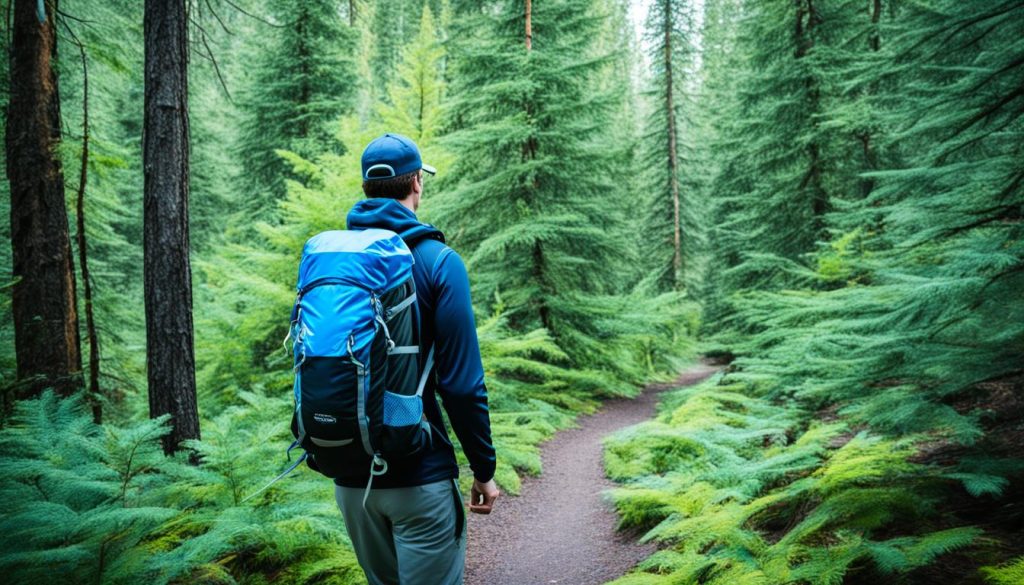
Conclusion
Living a minimalist life can make your life simpler and more fulfilling. By cleaning out your spaces and shopping with care, you can lower stress and focus better. It’s about making room for what really matters, not cutting out everything.
Start your journey to a simpler life and find freedom, peace, and happiness. Simple living means choosing what’s important and enjoying the benefits of a minimalist way of life. As you keep decluttering and organizing, you’ll see how a minimalist life can lead to a more meaningful existence.
Minimalism is a personal path, so it might look different for everyone. Be open to finding what suits you best. With a curious mind and a readiness to try new things, you can create a minimalist life that fits your values and goals.

